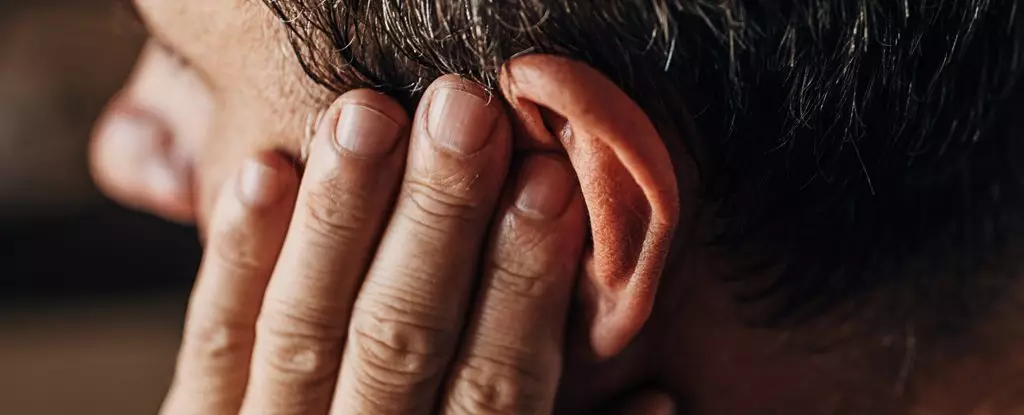Tinnitus, a condition that plagues around 15% of the global population, is characterized by the perception of sound—often described as ringing or buzzing—in the absence of an external auditory source. This auditory phenomenon frequently coincides with hearing loss, posing significant challenges not only for physical comfort but also for mental well-being. Sufferers often find the persistent sound irritating, leading to increased levels of stress and anxiety and potentially culminating in severe conditions such as depression. Given that there is currently no definitive cure for tinnitus, the search for effective management strategies has gained momentum. One intriguing avenue of research focuses on the relationship between tinnitus and sleep.
Tinnitus is often categorized as a “phantom perception,” a neurological occurrence where the brain generates auditory stimuli that do not correlate with external sounds. Unlike typical phantom perceptions that manifest during sleep, individuals with tinnitus confront these unsettling sounds while awake. This strange phenomenon can primarily be attributed to abnormalities in brain activity, particularly in regions responsible for auditory processing. Research indicates that these areas may exhibit hyperactivity, shedding light on how tinnitus is experienced. This relationship becomes particularly relevant when we consider the sleeping brain, as sleep is also linked with alterations in brain activity levels.
A comprehensive review has identified several brain mechanisms that intertwine sleep and tinnitus. A better understanding of these connections could significantly advance our ability to manage and treat tinnitus. During sleep, particularly during the slow-wave phase, the brain experiences cyclical waves of electrical activity that activate various regions, including those critical for memory and auditory processing. This stage is essential for restorative functions, allowing neurons to recuperate and facilitating overall cognitive health. However, the presence of frequent hyperactivity in specific brain regions during sleep has been documented, suggesting similarities with scenarios found in sleep disorders such as somnambulism (sleepwalking).
The Sleep-Tinnitus Connection and the Challenge of Restorative Slumber
For individuals suffering from tinnitus, this hyperactivity may manifest as disruptions in sleep. It appears that tinnitus can interfere with the brain’s ability to reach deep, restorative slow-wave sleep. The frustration arises as disrupted sleep can further exacerbate the experience of tinnitus, creating a vicious cycle. While it is evident that those with tinnitus generally find themselves spending more time in light sleep—lessening the benefits gained from the critical stage of slow-wave sleep—research has illuminated a silver lining; certain deep sleep stages may remain relatively unaffected by the condition.
Neuroscientific understanding suggests that slow-wave sleep may actively suppress tinnitus. The restoration that occurs during deep sleep—a period when neurons might enter a state of “slow-wave activity” mode—could potentially inhibit the hyperactive regions responsible for tinnitus perception. Moreover, the activity fluctuations of the brain during deep sleep might serve to mitigate disturbances caused by tinnitus. This dual interaction between sleep and tinnitus not only raises questions about the precise mechanics of these linkages but also proposes interesting implications for intervention strategies.
The integral role that sleep plays in modulating tinnitus offers a tantalizing prospect for future therapeutic interventions. By exploring the relationship and dynamics between sleep stages and tinnitus intensity, we may ultimately enhance treatment paradigms that cater specifically to the needs of tinnitus patients. Current exploration into sleep restriction programs, which encourage patients to only go to bed when genuinely fatigued, aims to promote deeper sleep and might facilitate a better understanding of how fluctuations in tinnitus intensity correlate with various sleep patterns.
Future directions in this research domain could greatly benefit from tracking sleeping brain activity alongside tinnitus symptoms in real-time. By recording both phenomena simultaneously, researchers could decode the complexities of how various sleep stages—especially rapid eye movement (REM) sleep—impact the auditory perceptions linked to tinnitus. This dual approach not only stands to deepen our understanding of the neurobiology underlying tinnitus and sleep but could also illuminate innovative paths for treatment.
While tinnitus may currently have no known cure, the intricate relationships between this condition and sleep represent a fertile ground for exploration. Understanding how these two factors interact may unveil new strategies to improve the quality of life for millions around the world, opening doors for innovative therapies that bridge the gap between rest and auditory relief. As research continues to unfold, the hope is that we can better integrate sleep science into tinnitus management, ultimately working toward more effective treatment options for those affected by this bewildering auditory experience.

